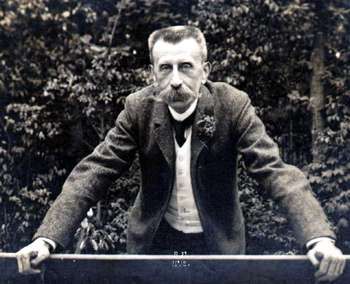Composed 1903; 20 minutes
Moszkowski's G minor Suite for two violins, published in 1903 when his fortunes were at their peak, is a genial work and elegantly written for both instruments. The suite includes its fair share of gently nostalgic and occasionally sentimental music, as we might expect from a once fashionable composer writing at the turn of the 19th century. But Moszkowski knew his counterpoint and the music reflects the craft of a musician who had an exceptional working knowledge of both violin and piano. The first movement opens with the structure and contrast of a full-blown sonata-form movement, with a shortened revisiting of both themes making the title ‘suite’ more appropriate than ‘sonata.’ The lyrical second movement falls somewhere between graceful minuet and elegant waltz. A hushed slow movement is nostalgic and understated. In contrast, the finale is a full-blooded showpiece for all three instruments and gallops along like a perpetuum mobile, punctuated only by a generously lyrical slower theme.
 A leading teacher in Berlin, Moszkowski dressed elegantly, with A waxed handlebar moustache and fashionable Prussian crew-cut. By 1897, famous and wealthy throughout Europe as a virtuoso pianist, composer and teacher (and now living in Paris), he was more strikingly dressed, with long hair after the style of Franz Liszt. Liszt, indeed, admired Moszkowski’s Piano Concerto and performed it in a joint concert, with the composer conducting. His two volumes of Spanish Dances were hugely popular throughout Europe, representing just a handful of his fashionable 200 small-scale piano pieces. But fashions change and with them, fortunes too. By the beginning of the First World War, Moszkowski was a recluse; by its end, his personal fortune of European bonds and securities, amassed through his concert appearances and by selling the copyrights to all his compositions, was worthless. News of his dire straits eventually reached friends and former students in New York. In 1921, many piano virtuosos banded together to put on a monster benefit concert on the 15 grand pianos assembled onstage at Carnegie Hall. But the $13,275 they raised did not reach Moszkowski until the year of his death.
A leading teacher in Berlin, Moszkowski dressed elegantly, with A waxed handlebar moustache and fashionable Prussian crew-cut. By 1897, famous and wealthy throughout Europe as a virtuoso pianist, composer and teacher (and now living in Paris), he was more strikingly dressed, with long hair after the style of Franz Liszt. Liszt, indeed, admired Moszkowski’s Piano Concerto and performed it in a joint concert, with the composer conducting. His two volumes of Spanish Dances were hugely popular throughout Europe, representing just a handful of his fashionable 200 small-scale piano pieces. But fashions change and with them, fortunes too. By the beginning of the First World War, Moszkowski was a recluse; by its end, his personal fortune of European bonds and securities, amassed through his concert appearances and by selling the copyrights to all his compositions, was worthless. News of his dire straits eventually reached friends and former students in New York. In 1921, many piano virtuosos banded together to put on a monster benefit concert on the 15 grand pianos assembled onstage at Carnegie Hall. But the $13,275 they raised did not reach Moszkowski until the year of his death.